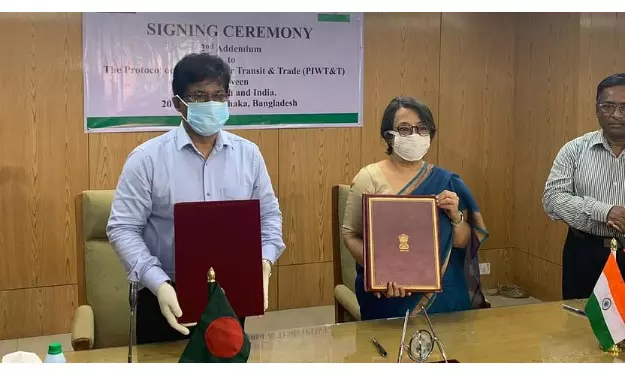To boost trade India, Bangladesh add five more water routes

Collected
To boost trade, economical activity and connectivity, India and Bangladesh have added five more "ports of call" on either side and increased the protocol (water) routes from 8 to 10.
"These additions to the protocol will facilitate bilateral trade with improved reliability and cost effectiveness for the business community and the persons of both countries," the official release said.
The release issued after signing of the next Addendum to the Protocol on Inland Water Transit and Trade, in Dhaka on Wednesday, said the extension of protocol routes, inclusion of new routes and declaration of new "ports of call" would facilitate trade.
The Second Addendum was signed by Indian High Commissioner in Bangladesh Riva Ganguly Das and Bangladesh Shipping Ministry Secretary Mohammed Mezbah Uddin Chowdhury.
There are six "ports of call" each in India and Bangladesh. The brand new five "ports of call" on the Indian side are Dhulian, Maia, Kolaghat, Sonamura and Jogigopha and on the Bangladesh side Rajshahi, Sultanganj, Chilmari, Daudkandi and Bahadurabad.
Two more extended 'ports of call" - Tribeli (Bandel) and Badarpur in India and Ghorasal and Muktarpur in Bangladesh - have already been added.
According to the release, connectivity supplied by the existing and the new protocol routes is all the more pertinent in the COVID-19 scenario. They'll provide economical, faster, safer and greener mode of transport for trade and business.
The new agreement will help improve movement of cargo vessels within an organised manner on the protocol routes. The Indian transit cargo is mainly coal, fly-ash, POL and heavy machineries for power projects in the northeast. The other likely cargo is fertilizers, cement, grain, farm products and containers.
The export cargo from India to Bangladesh is principally fly-ash (around 30 lakh tonnes yearly). Around 638 inland vessels (including 600 Bangladeshi flag vessels) do 4,000 loaded voyages annually.
Both the countries have also decided to introduce trade between Chilmari (Bangladesh) and Dhubri (Assam, India) through the use of shallow draft mechanised vessels.
It'll allow export of stone chips and other Bhutanese and Northeast cargo and quick access for traders to the hinterland of Bangladesh, boosting the neighborhood economy in Bangladesh and the lower Assam region.
Inclusion of Jogigopha (India) and Bahadurabad (Bangladesh) as new "port of call" will provide connectivity to Meghalaya, Assam and Bhutan. Jogigopha (in western Assam) also becomes important as a multi-modal logistics park is on cards there.
The new "ports of call" will allow loading and unloading of cargo transported on the India-Bangladesh Protocol Route and stimulate monetary development of new places and their hinterland.
Inclusion of Sonamura (Tripura)-Daudkhandi (Bangladesh) stretch of the Gumti river (93 km) as IBP route # 9 9 and 10 in the protocol will improve connectivity of Tripura and adjoining northeastern states with India and Bangladesh's economical centres and will help the hinterland of both countries.
Before signing of the next Addendum, Indian and Bangladesh officials had meetings in October 2018 in New Delhi and in December 2019 in Dhaka and finalised extension of protocol routes, inclusion of new routes and declaration of new "ports of call".
In line with the release, this protocol, first signed in 1972 soon after independence of Bangladesh, is a reflection of shared history, trusted friendship and mutually beneficial partnership.
It had been last renewed in 2015 for five years with a provision of computerized renewal for another five years, giving long-term assurance to stakeholders.
Tripura Chief Minister Biplab Kumar Deb thanked Prime Minister Narendra Modi and Bangladesh Premier Sheikh Hasina for the signing of Second Addendum to boost connectivity and trade between the two neighbours. (IANS)
Source: https://www.sentinelassam.com
Tags :
Previous Story
- Asia Frontier Capital - Bangladesh Travel Report
- Dhaka shuts brick kilns to fight smog, leaving...
- Buoyant economy sending positive signals to global investors
- Mosquito repellents see robust sale
- Bangladesh’s first female motor mechanic
- Bangladesh Buildcon, Wood International Expo begin
- Students from Sunnydale Attending 25th Australian Jamboree
- Envoy: Bangladesh set to see more Japanese entrepreneurs